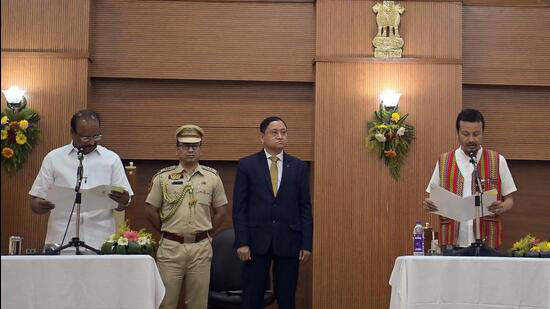The political landscape in Tripura has witnessed a significant shift with the recent allocation of portfolios to two ministers from the Indigenous People’s Front, Tipraha (TIPRA Motha) party in the state government. This development marks a crucial step towards inclusivity and representation of indigenous communities in governance, reflecting the government’s commitment to address the aspirations and concerns of diverse ethnic groups in Tripura. The allocation of portfolios to TIPRA Motha ministers underscores the importance of coalition politics and collaboration in fostering equitable development and social cohesion in the state.
The Indigenous People’s Front, Tipraha (TIPRA Motha) emerged as a formidable political force in Tripura following its landslide victory in the Tripura Tribal Areas Autonomous District Council (TTAADC) elections. The party’s electoral success highlighted the growing demand for greater autonomy and empowerment among indigenous communities in the state. In a significant move towards accommodating the aspirations of these communities, the Tripura government has allocated portfolios to two TIPRA Motha ministers in the state cabinet.
The allocation of portfolios to TIPRA Motha ministers reflects a spirit of cooperation and partnership between the ruling Bharatiya Janata Party (BJP) and the TIPRA Motha party. This collaborative approach is essential for addressing the diverse needs and concerns of Tripura’s multi-ethnic society and promoting inclusive governance. By incorporating indigenous voices into the decision-making process, the government aims to bridge the gap between mainstream politics and the aspirations of marginalized communities.
The portfolios allocated to TIPRA Motha ministers encompass key sectors that are crucial for the socio-economic development of Tripura and the welfare of its people. These portfolios include areas such as tribal welfare, social justice, rural development, and youth affairs, which are of particular relevance to indigenous communities. By entrusting TIPRA Motha ministers with these responsibilities, the government signals its commitment to addressing the socio-economic disparities and empowering marginalized groups in the state.
The allocation of portfolios to TIPRA Motha ministers is a significant step towards decentralization and grassroots empowerment in Tripura. By empowering indigenous leaders at the grassroots level, the government aims to strengthen local governance structures and ensure that development initiatives are tailored to the specific needs of tribal communities. This approach fosters greater participation and ownership among indigenous communities, paving the way for more inclusive and sustainable development outcomes.
Furthermore, the allocation of portfolios to TIPRA Motha ministers reflects the government’s recognition of the unique challenges faced by indigenous communities in Tripura and its commitment to addressing them effectively. These challenges include issues such as land rights, access to basic services, cultural preservation, and economic empowerment. By entrusting TIPRA Motha ministers with key portfolios, the government sends a strong signal of its willingness to work collaboratively with indigenous leaders to tackle these pressing issues and build a more inclusive and equitable society.
The inclusion of TIPRA Motha ministers in the state cabinet also paves the way for greater dialogue and cooperation between the government and indigenous communities. By fostering open communication and consultation, the government can gain valuable insights into the priorities and concerns of indigenous groups and develop policies and programs that are responsive to their needs. This participatory approach to governance strengthens trust and mutual respect between the government and indigenous communities, laying the foundation for meaningful and sustainable development partnerships.
In addition to promoting inclusive governance, the allocation of portfolios to TIPRA Motha ministers sends a positive message of unity and solidarity among Tripura’s diverse ethnic groups. By recognizing the contributions of indigenous leaders to the state’s development agenda, the government reinforces the importance of diversity and pluralism in Tripura’s socio-political fabric. This inclusive approach fosters a sense of belonging and shared identity among all communities, paving the way for social cohesion and harmony in the state.
In a nutshell, the allocation of portfolios to TIPRA Motha ministers in the Tripura government marks a significant milestone in the state’s political landscape. By empowering indigenous leaders and incorporating their voices into the decision-making process, the government demonstrates its commitment to inclusive governance and grassroots empowerment. This collaborative approach not only addresses the unique needs and concerns of indigenous communities but also fosters greater unity and solidarity among all segments of Tripura’s society.

